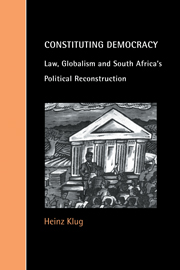Book contents
- Frontmatter
- Contents
- Acknowledgements
- Abbreviations
- Introduction
- 1 Post–Twentieth-Century Constitutionalism?
- 2 Legal Legacies and Constitutional Paths
- 3 Constitutionalism in Global Perspective
- 4 Constitutional Strategies
- 5 Constitutionalism in the Democratic Transition
- 6 Global Impact: International Imperatives and their Hybridization
- 7 The Constitutional Court and the Institutional Dynamics of Constitutionalism
- 8 Constitutional Imaginations and the Possibilities of Justice
- Conclusion
- Notes
- Bibliography
- Index
6 - Global Impact: International Imperatives and their Hybridization
Published online by Cambridge University Press: 06 July 2010
- Frontmatter
- Contents
- Acknowledgements
- Abbreviations
- Introduction
- 1 Post–Twentieth-Century Constitutionalism?
- 2 Legal Legacies and Constitutional Paths
- 3 Constitutionalism in Global Perspective
- 4 Constitutional Strategies
- 5 Constitutionalism in the Democratic Transition
- 6 Global Impact: International Imperatives and their Hybridization
- 7 The Constitutional Court and the Institutional Dynamics of Constitutionalism
- 8 Constitutional Imaginations and the Possibilities of Justice
- Conclusion
- Notes
- Bibliography
- Index
Summary
Despite the particularities of South Africa's history and democratic transition, the basic features of the new constitutional order – including a Bill of Rights, Constitutional Court, and a plethora of independent institutions – conform to the basic elements of the post–cold war international political culture as expressed in the processes of state reconstruction characterizing the last decade of the twentieth century. However, the constitutional outcomes – the 1993 ‘interim’ and 1996 ‘final’ Constitutions – of South Africa's democratic transition also reflect the post–cold war international political culture in a particular hybridity, reflecting the specific political struggles and historical legacies which shaped and gave legitimacy to each particular constitutional option. It is this interaction, between the authority of particular alternatives and the conflicting demands of local politics, that is revealed through the debates, negotiations and compromises which surrounded the adoption or exclusion of particular constitutional options.
Understanding the constitutive role of law in processes of state reconstruction, and in the South African case in particular, requires a brief exploration of the origins and conflicts surrounding the inclusion of different elements of South Africa's new constitutional order. While it is possible to identify those elements which clearly reflect South Africa's embrace of the dominant international norms on the one hand, and also those elements that reflect the particularities of South African culture and history on the other, the clearest way to explore the interaction between these different elements will be to focus on those elements whose fate – inclusion, exclusion or hybridization – was the product of intense political conflict during the constitution-making process.
- Type
- Chapter
- Information
- Constituting DemocracyLaw, Globalism and South Africa's Political Reconstruction, pp. 118 - 138Publisher: Cambridge University PressPrint publication year: 2000



